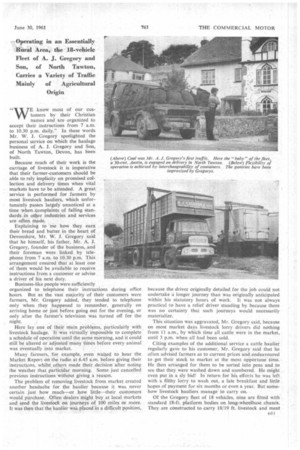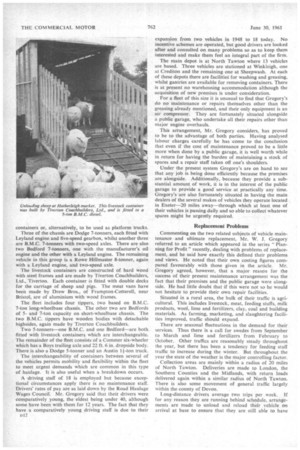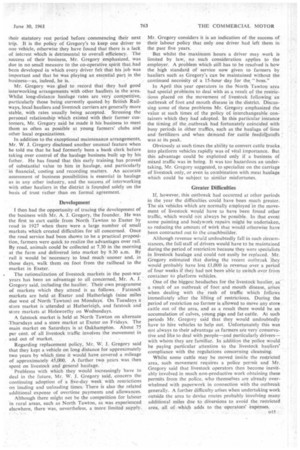" E know most of our cus tomers by their
Page 77

Page 78

Page 81

If you've noticed an error in this article please click here to report it so we can fix it.
Christian names and are organized to accept their instructions from 7 a.m. to 10.30 p.m. daily." In these words Mr. W. L Gregory spotlighted the personal service on which the haulage business of A. J. Gregory and Son, of North Tawton, Devon, has been built.
Because much of their work is the carriage of livestock it is imperative that their farmer-customers should be able to rely itnplicity on promised collection and delivery times when vital markets have to be attended. A great service is performed for farmers by most livestock hauliers, which unfortunately passes largely unnoticed at a time when complaints of falling standard in other industries and services are often made.
Explaining to me how they earn their bread and butter in the heart of Devonshire, Mr. W. I. Gregory said that he himself, his father, Mr. A. J. Gregory, founder of the business, and their foreman were linked by telephone from 7 a.m. to 10.30 p.m. This arrangement ensured that at least one of them would be available to receive instructions from a customer or advise a driver of his next duty.
Business-like people were sufficiently organized to telephone their instructions during office hours. But as the vast majority of their customers were farmers, Mr. Gregory added, they tended to telephone only when they happened to remember, generally on arriving home or just before going out for the evening, or only after the farmer's television was turned off for the night.
Here lay one of their main problems, particularly with livestock haulage. It was virtually impossible to complete a schedule of operation until the same morning, and it could still be altered or adjusted many times before every animal was eventually into market.
Many farmers, for example, even waited to hear the Market Report on the radio at 6.45 a.m. before giving their instructions, whilst others made their decision after noting the weather that particular morning. Some just cancelled previous instructions without giving a reason.
The problem of removing livestock from market created another headache for the haulier because it was never certain just how much—or how little—their customers Would purchase. Often dealers might 1)4 at local markets and send the livestock on journeys of 100 miles or more. It was then that the haulier was placed in a difficult position, because the driver originally detailed for the job could not undertake a longer journey than was originally anticipated within his statutory hours of work. It was not always practical to have a relief driver standing by because there was no certainty that such journeys would necessarily materialize.
This situation was aggravated, Mr. Gregory said, because on most market days livestock lorry drivers did nothing from 11 a.m., by which time all cattle were in the market, until 3 p.m. when all had been sold.
Citing examples of the additional service a cattle haulier regularly gave to his customer, Mr. Gregory said that he often advised farmers as to current prices and endeavoured to get their stock to market at the most opportune time. He then arranged for them to be sorted into pens and to see that they were washed down and numbered. He might even put in a sly bid! In return for his efforts he was left with a filthy lorry to wash out, a late breakfast and little hopes of payment for six months or even a year. But somehow livestock hauliers manage to carry on.
Of the Gregory fleet of 18 vehicles, nine are fitted with standard 18-ft. platform bodies on long-wheelbase chassis. They are constructed to carry 18/19 ft. livestock and meat pi l containers or, alternatively, to be used as platform trucks.
Three of the chassis are Dodge 7-tonners, each fitted with Leyland engine and five-speed gearbox, whilst another three are B.M.C. 7-tonners with two-speed axles. There are also two Bedford 7-tonners, one with the manufacturer's oil engine and the other with a Leyland engine. The remaining vehicle in this group is a Rowe Hil!master 8-tonner, again with a Leyland engine, and two-speed axle.
The livestock containers are constructed of hard wood with steel frames and are made by Tiverton Coachbuilders, Ltd., Tiverton. Each container is fitted with double decks for the carriage of sheep and pigs. The meat vans have been made by Drew Bros., of Frampton-Cotterell, near Bristol, are of aluminium with wood frames.
The fleet includes four tippers, two based on B.M.C. 7-ton long-wheelbase chassis. The other two are Bedfords of 5and 7-ton capacity on short-wheelbase chassis. The two B.M.C. tippers have wooden bodies with detachable highsides, again made by Tiverton Coachbuilders, Two 5-tonners—one B.M.C. and one Bedford—are both fitted with livestock containers which are interchangeable. The remainder of the fleet consists of a Commer six-wheeler which has a Boys trailing axle and 22 ft. 6 in. dropside body. There is also a Dodge 5-tonner and an Austin I4-ton truck.
The interchangeability of containers between several of the vehicles permits mobility and flexibility within the fleet to meet urgent demands which are common in this type of haulage. It is also useful when a breakdown occurs.
A driving staff of 18 is employed but because exceptional circumstances apply there is no maintenance staff. Drivers' rates of pay are as laid down by the Road Haulage Wages Council. Mr. Gregory said that their drivers were comparatively young, the eldest being under 40, although some have been with them for 12 years. The fact that they have a comparatively young driving staff is due to their expansion from two vehicles in 1948 to 18 today. No incentive schemes are operated, but good drivers are looked after and consulted on many problems so as to keep them interested and make them feel an integral part of the firm.
The main depot is at North Tawton where 13 vehicles are based. Three vehicles are stationed at Winkleigh, one at Crediton and the remaining one at Sheepwash. At each of these depots there are facilities for washing and greasing, whilst gantries are available for removing containers. There is at present no warehousing accommodation although the acquisition of new premises is under consideration.
For a fleet of this size it is unusual to find that Gregory's do no maintenance or repairs themselves other than the greasing already mentioned, and their only equipment is an air compressor. They are fortunately situated alongside a public garage, who undertake all their repairs other than major engine overhauls.
This arrangement, Mr. Gregory considers, has proved to be to the advantage of both parties. Having analysed labour charges carefully he has come to the conclusion that even if the cost of maintenance proved to be a little more when done by a public garage, it is well worth while in return for having the burden of maintaining a stock of spares and a repair staff taken off one's shoulders.
Under the present system Gregory's are on hand to see that any job is being done efficiently because the premises are alongside. Additionally, because they provide a substantial amount of work, it is in the interest of the public garage to provide a good service at practically any time. Gregory's are also fortunately situated in having the main dealers of the several makes of vehicles they operate located in Exeter-20 miles away—through which at least one of their vehicles is passing daily and so able to collect whatever spares might be urgently required.
Replacement Problems
Commenting on the two related subjects of vehicle maintenance and ultimate replacement, Mr. W. J. Gregory referred to an article which appeared in the series "Planfling for Profit" recently, dealing with problems of replacement, and he said how exactly this defined their problems and views. He noted that their own costing figures compared favourably with those given in the article. Mr. Gregory agreed, however, that a major reason for the success of their present maintenance arrangement was the fact that their premises and the public garage were alongside. He had little doubt that if this were not so he would not hesitate to provide their own repair facilities.
Situated in a rural area, the bulk of their traffic is agricultural. This includes livestock, meat, feeding stuffs, milk products, wool, lime and fertilizers, clay, coal and building materials. As farming, marketing, and slaughtering facilities improved, traffic should expand.
There are seasonal fluctuations in the demand for their services. Thus there is a call for swedes from September to March and lime and fertilizers from February to October. Other traffics are reasonably steady throughout the year, but there has been a tendency for feeding stuff traffic to increase during the winter. But throughout the year the state of the weather is the major controlling factor.
Collection areas are mainly within a radius of 20 miles of North Tawton. Deliveries are made to London, the Southern Counties and the Midlands, with return loads delivered again within a similar radius of North Tawton. There is also some movement of general traffic largely within the county of Devon.
Long-distance drivers average two trips per week. If for any reason they are running behind schedule, arrangements are made to unload and reload their vehicle on arrival at base to ensure that they are still able to have
their statutory rest period before commencing their next trip. It is the policy of Gregory's to keep one driver to one vehicle, otherwise they have found that there is a lack of interest which is detrimental to overall efficiency. The success of their business, Mr. Gregory emphasized, was due in no small measure to the co-operative spirit that had been developed in which every driver felt that his job was important and that he was playing an essential part in the business—as, indeed, he is.
Mr. Gregory was glad to record that they had good interworking arrangements with other hauliers in the area. Whilst long-distance haulage rates are very competitive, particularly those being currently quoted by British Railways, local hauliers and livestock carriers are generally more stable, with rates usually being accepted. Stressing the personal relationship which existed with their farmer customers, Mr. Gregory said he made it his business to meet them as often as possible at young farmers' clubs and other local organizations.
In addition to the exceptional maintenance arrangements, Mr. W. J. Gregory disclosed another unusual feature when he told me that he had formerly been a bank clerk before taking over control of the haulage business built up by his father. He has found that this early training has proved of substantial value to him in haulage, and particularly in financial, costing and recording matters. An accurate assessment of business possibilities is essential in haulage as in any other industry, and the success of interworking with other hauliers in the district is founded solely on the basis of trust rather than on formal agreement.
Development
I then had the opportunity of tracing the development of the business with Mr. A. J. Gregory. the founder. He was the first to cart cattle from North Tawton to Exeter by road in 1927 when there were a large number of small markets which created difficulties for all concerned. Once the road service had been shown to be a practical proposition, farmers were quick to realize the advantages over rail. By road, animals could be collected at 7.30 in the morning at the farm and delivered into market by 9.30 a.m. By rail it would be necessary to load much sooner and, in those days, walk them on foot from the railhead to the market in Exeter.
The rationalization of livestock markets in the post-war years has been an advantage to all concerned, Mr. A. J. Gregory said, including the haulier. Their own programme of markets which they attend is as follows. Fatstock markets are held at Exeter and Hatherleigh (nine miles due west of North Tawton) on Mondays. On Tuesdays a store market is attended at Hatherleigh, and fatstock and store markets at Holsworthy on Wednesdays.
A fatstock market is held at North Tawton on alternate Thursdays and a store market at Exeter on Fridays. The main market on Saturdays is at Oakhampton. About 75 per cent. of all livestock traffic involves the movement in and out of market.
Regarding replacement policy, Mr. W. J. Gregory said that they kept a vehicle on long distance for approximately two years by which time it would have covered a mileage of approximately 43,000. A further two years was then spent on livestock and general haulage.
Problems with which they would increasingly have to deal in the future, Mr. W. J. Gregory said, concern the continuing adoption of a five-day week with restrictions on 'loading arid unloading times. There is also the related additional expense of overtime payments and allowances.
Although there might not be the competition for labour in rural areas, such as North Tawton, as was experienced elsewhere, there was, nevertheless, a more limited supply. Mr. Gregory considers it is an indication of the success of their labour policy that only one driver had left them in the past five years.
But whilst the maximum hours a driver may work is limited by law, no such consideration applies to the employer. A problem which still has to be resolved is how the high standard of service now given to farmers by hauliers such as Gregory's can be maintained without the continued neceisity of a 15-hour day for the "boss."
In April this year operators in the North Tawton area had special problems to deal with as a result of the restrictions placed on the movement of livestock following an outbreak of foot and mouth disease in the district. Discussing some of these problems Mr. Gregory emphasized the value at such times of the policy of interchangeable containers which they had adopted. In this particular instance the timing of the outbreak had fortunately coincided with busy periods in other traffics, such as the haulage of lime and fertilizers and when demand for cattle feedirigstuffs was at its peak.
Obviously at such times the ability to convert cattle trucks into platform vehicles rapidly was of vital importance. But this advantage could be exploited only if a business of mixed traffic was in being. It was too hazardous an undertaking, Mr. Gregory suggested, to specialize on the carriage of livestock only, or even in combination with meat haulage which could be subject to similar misfortunes.
Greater Difficulties
If, however, this outbreak had occurred at other periods in the year the difficulties could have been much greater. The six vehicles which are normally employed in the movement of livestock would have to have been found other traffic, which would not always be possible. In that event some painting and bodywork repairs might be undertaken, so reducing the amount of work that would otherwise have been contracted out to the coachbuilder.
Although revenue would undoubtedly fall in such circumstances, the full staff of drivers would have to be maintained during the period of restriction because they were specialists in livestock haulage and could not easily be replaced. Mr. Gregory estimated that during the recent outbreak they would probably have lost £1 ,000 in revenue over a period of four weeks if they had not been able to switch over from . container to platform vehicles.
One of the biggest headaches for the livestock haulier. as' a result of an outbreak of foot and mouth disease, arises when dealing with the rush of traffic which follows immediately after the lifting of restrictions. During the period of restriction no farmer is allowed to move any store cattle out of the area, and as a result there would be an accumulation of calves, young pigs and fat cattle. At such periods Mr. Gregory said that they would undoubtedly have to hire vehicles to help out. Unfortunately this was not always to their advantage as farmers are very conservative and like to deal with people—and particularly drivers— with whom they are familiar. In addition the police would be paying particular attention to the livestock hauliers' compliance with the regulations concerning cleansing.
Whilst some cattle may be moved inside the restricted area, such movement requires a police permit and Mr. Gregory said that livestock operators then become inevitably involved in much non-productive work obtaining these permits from the police, who themselves are already overwhelmed with paperwork in connection with the outbreak generally. A further difficulty arises when undertaking work outside the area to devise routes probably involving many additional miles due to diversions to avoid the restricted area, all of which adds to the operators' expenses.




































































































































































